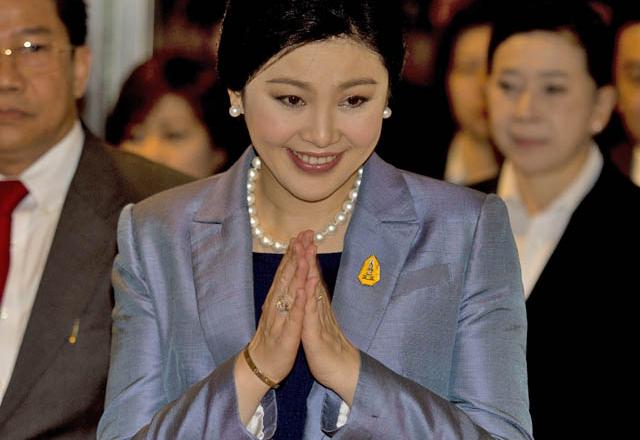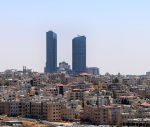You are here
Thai protesters move to downtown Bangkok in bid to topple PM
By Reuters - Feb 03,2014 - Last updated at Feb 03,2014
BANGKOK — Thai anti-government protesters who have been camped out in north Bangkok packed their tents and marched downtown on Monday as they consolidated efforts to topple Prime Minister Yingluck Shinawatra, a day after a disrupted general election.
Some joined protest leader Suthep Thaugsuban on foot and others followed in cars and six-wheel trucks as Thailand’s long-running political conflict showed no sign of ending.
They closed camps at two of the seven big intersections that they have blockaded since mid-January, at Victory Monument and Lat Phrao, and headed for the fringes of the central oasis of Lumpini Park.
A third camp run by an allied group at a big government administrative complex may also be closed.
Suthep said on Sunday this was being done out of safety concerns, but it could also be because their numbers are dwindling. Reuters put the number of marchers at about 3,000.
“Suthep’s movement is now crumbling, but it still has powerful unseen backers,” said Chris Baker, a historian and prominent Thailand scholar.
“Backdoor negotiations are needed because both sides will avoid any direct confrontation in public view. The business lobby should revive its efforts to play the intermediary role.”
Suthep’s supporters on the route showed no sign of crumbling, waving flags and handing over money.
The demonstrators blocked balloting in a fifth of the country’s constituencies on Sunday, saying Yingluck must resign and make way for an appointed “people’s council” to overhaul a political system they say has been taken hostage by her billionaire brother and former premier, Thaksin Shinawatra.
The election, boycotted by the main opposition Democrat Party, is almost certain to return Yingluck to power and, with voting passing off peacefully across the north and northeast, Yingluck’s supporters will no doubt claim a legitimate mandate.
But there was no indication of when re-votes of Sunday’s disrupted ballots will be held or when the election commission will be able to announce a result, which will be the object of legal challenges anyway, including from the leader of the Democrats, former premier Abhisit Vejjajiva.
The result is unlikely to change the dysfunctional status quo in a country popular with tourists and investors yet blighted by eight years of polarisation and turmoil, pitting the Bangkok-based middle-class and royalist establishment against the mostly poor, rural supporters of the Shinawatras.
The election was peaceful, apart from a few scuffles, with no repeat of the chaos seen the previous day, when supporters and opponents of Yingluck clashed in north Bangkok. Seven people were wounded by gunshots or explosions.
The protesters have rallied in Bangkok since November to try to oust Yingluck. They wanted electoral rules rewritten before any election and have vowed to keep up the protests.
“I’m confident this election won’t lead to the formation of a new government,” Suthep told supporters late on Sunday.
Giving provisional data on Monday, the election commission said 20.4 million people cast their vote on Sunday, just under 46 per cent of the 44.6 million eligible voters in 68 of 77 provinces. In the other nine provinces, no voting was possible.
Voting was disrupted in 18 per cent of constituencies, 67 out of 375, the commission said, revising data given Sunday.
It could be weeks before seats in the constituencies that saw disruption are filled and parliament can be convened, so Yingluck will remain a caretaker premier with no policy authority, unable to approve any new government spending.
“Having gone through more than two months of protests, the election will strengthen Yingluck’s position, but her troubles are not over yet,” said Kan Yuanyong, director of the Siam Intelligence Unit think tank.
“We’ll see a continuation of the conflict, the standoff remains and the likelihood of more violence could increase.”
The turmoil is taking an economic toll with tourism in particular being hit.
The protesters say former telecoms tycoon Thaksin has subverted a fragile democracy with populist politics such as subsidies, cheap loans and healthcare to woo the poor and guarantee victory for his parties in every election since 2001.
Thaksin’s critics also accuse him of disrespecting Thailand’s revered monarchy, which he denies.
Thaksin has lived abroad since 2008 to avoid a jail term for a graft conviction he says was politically motivated. Critics say Yingluck is merely a stand-in for him.
Related Articles
A Thai court ordered Prime Minister Yingluck Shinawatra to step down on Wednesday after finding her guilty of abusing her power, prolonging a political crisis that has led to violent protests and brought the economy close to recession.
Thailand’s constitutional court said it will rule on Wednesday whether to remove Prime Minister Yingluck Shinawatra from office on abuse of power charges, a verdict that could plunge the country deeper into crisis.
Protesters trying to topple Thailand’s government tightened a blockade around ministries on Tuesday and their leader warned the prime minister that she could be targeted next, as some saw more than two months of turmoil inching towards an endgame.

















